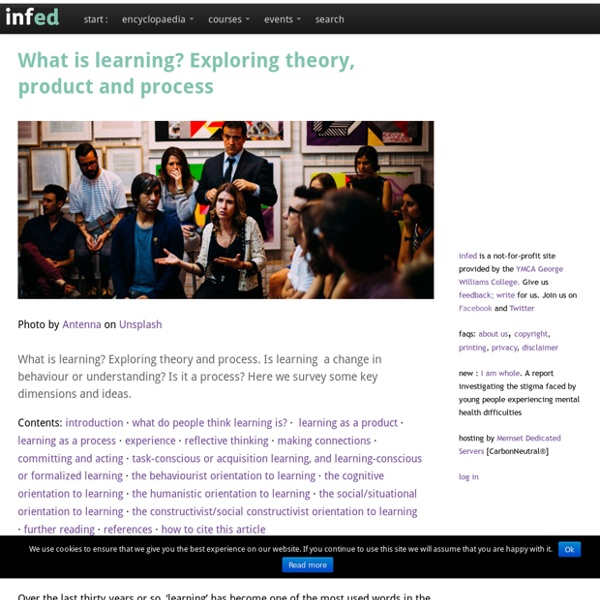The concept of ako / Aspects of planning / Teaching and learning te reo Māori / Curriculum guidelines / Home - Te reo Māori
Te Aho Arataki Marau mō te Ako i Te Reo Māori - Kura Auraki Curriculum Guidelines for Teaching and Learning Te Reo Māori in English-medium Schools: Years 1-13 The concept of ako describes a teaching and learning relationship, where the educator is also learning from the student and where educators’ practices are informed by the latest research and are both deliberate and reflective.
Online Learning
Online learning is a general term used to refer to learning experiences that are delivered via a computer network to learners in different physical locations. Online learning is also known as e-Learning, although that is somewhat of an ambiguous term since just about all learning has some level of "e" in it. In addition, we use technology to enhance our work and we don't call it "e-work".
chris argyris, double-loop learning and organizational learning @ the encyclopedia of informal education
contents: introduction · life · theories of action: theory in use and espoused theory · single-loop and double-loop learning · model I and model II · organizational learning · conclusion · further reading and references · links · cite Chris Argyris has made a significant contribution to the development of our appreciation of organizational learning, and, almost in passing, deepened our understanding of experiential learning. On this page we examine the significance of the models he developed with Donald Schön of single-loop and double-loop learning, and how these translate into contrasting models of organizational learning systems.
Morning meetings in a PYP classroom
Vanessa Keenan, Early Years 2 Teacher and Grade Level Leader, A Taaleem School, UAE In this article you will learn how to use the Responsive Classroom practice of morning meetings in the primary years programme class. Our IB Primary Years Programme (PYP) school has been implementing Responsive Classroom practices for the last two years, including holding Morning Meetings at the start of each day. I currently teach an early years class (5 year olds) and my meetings consist of four elements: a greeting, individual student sharing, a group activity and a written message. Morning meetings have several functions, including creating a respectful learning environment based on trust and to support each student to feel significant within the group.
Happiness report: Finland is world's 'happiest country' - UN
Image copyright Reuters This year's happiest place on Earth is Finland, according to an annual UN report - toppling Norway from the top spot. The World Happiness Report measures "subjective well-being" - how happy people feel they are, and why. Nordic countries regularly appear in the top five, while war-hit countries and a number in sub-Saharan Africa regularly appear in the bottom five. Burundi was the least happy, taking over from the Central African Republic. It was thrown into crisis when President Pierre Nkurunziza's bid for re-election to a third term in 2015 sparked protests by opposition supporters who said the move was unconstitutional.
The Adult Learning Theory - Andragogy - of Malcolm Knowles
Malcolm Shepherd Knowles (1913 – 1997) was an American educator well known for the use of the term Andragogy as synonymous to adult education. According to Malcolm Knowles, andragogy is the art and science of adult learning, thus andragogy refers to any form of adult learning. (Kearsley, 2010).
Service Learning : Teaching and Learning : The University of Western Australia
Enquiries All queries should be forwarded to Aden Date Service Learning Coordiinator. Current service learning units Click here for a list of currently approved service learning units and units with service learning components.. Definitions
Programming Your Brain: The Art of Learning in Three Steps
From time to time, I run into people who are interested in breaking into programming. Last night at the company holiday party a guy (we’ll call him Sam) walked up and introduced himself, asking for advice on how to move from his current role over to development. Sam’s attitude impressed me – those with a genuine desire to learn go places quickly.
Using Interactive Bulletin Boards in Your IB PYP Classroom – PYP Teaching Tools
Form : What does it look like? The Learner Profile, being the centre of the IB PYP, is also the central part of this interactive bulletin board display. The posters with the Learner Profile descriptors are actually pockets.
You are where you live: health, wealth and the built environment
Socioeconomic disadvantage and its impact on where we live and work (and how we get between the two), has enormous implications for health and well-being. But the picture is not as clear cut as many people assume. The built environment’s influence on health starts in the home – the place fulfilling a raft of basic physical, social and emotional needs. People with reasonable, reliable incomes are in a better position to afford well-designed and constructed accommodation that meets these requirements. But those struggling financially will find the high cost of housing a significant burden, typically resulting in basic health needs going unmet, as well as generating anxiety, stress and depression. Inner vs outer
Malcolm Knowles, informal adult education, self-direction and andragogy
contents: introduction · malcolm knowles – life · adult informal education · malcolm s. knowles on andragogy · self-direction · conclusion · further reading and references · links Malcolm Shepherd Knowles (1913 – 1997) was a, perhaps ‘the’, central figure in US adult education in the second half of the twentieth century. In the 1950s he was the Executive Director of the Adult Education Association of the United States of America. He wrote the first major accounts of informal adult education and the history of adult education in the United States. Furthermore, Malcolm Knowles’ attempts to develop a distinctive conceptual basis for adult education and learning via the notion of andragogy became very widely discussed and used.



